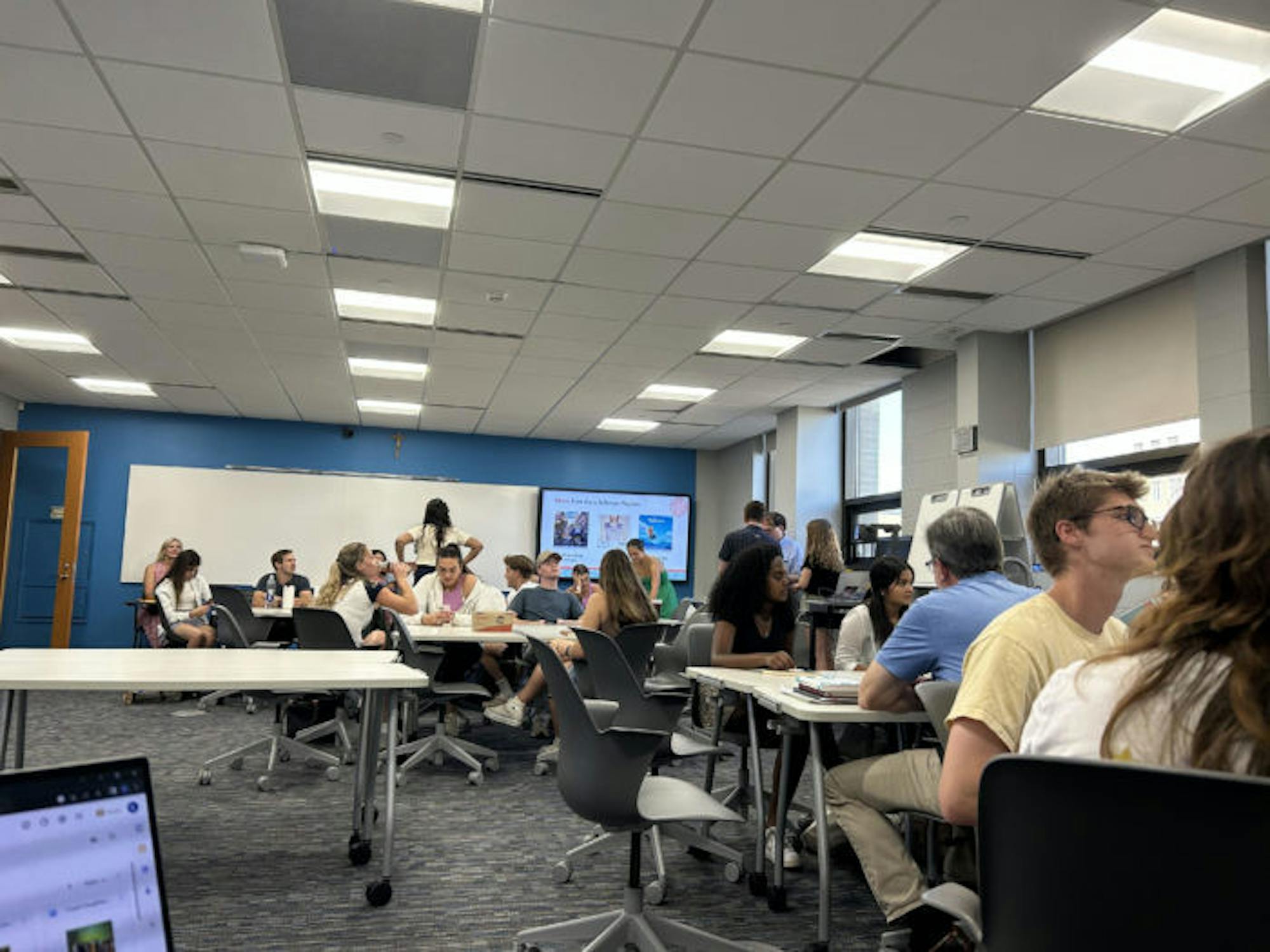
Students in the course "LifeDesign" organize in small groups for class discussion every Tuesday afternoon.
Every Tuesday from 3:30 p.m. to 6:15 p.m., students gather for “LifeDesign,” a global affairs elective centered around human flourishing and how to achieve a meaningful life as a Notre Dame student.
Steve Reifenberg, professor of international development at the Keough School of Global Affairs, first developed the course during the COVID-afflicted winter of 2021.
“There’s a lot of really good behavioral science around language like, ‘well-being,’ ‘flourishing,’ ‘happiness,’ ‘purpose’ and a lot of that we’ve learned about,” Reifenberg said. “And I think that it’s really valuable for students to have a space where they can think about the science, but in the context of their own lives, and really being very practical in practice.”
Reifenberg and the rest of the LifeDesign team attempt to structure the course to be highly conducive to student flourishing. LifeDesign favors a course website, rather than a Canvas page, on which students can find assignments, readings and other resources.
Reifenberg explained that much of the website resources were cultivated by students for students. A plethora of resources, including podcasts, TED talks and scientific articles, that sparked student interest are all gathered on this website.
“We tried to then put it in organized categories that track with a lot of the themes and so there’s a whole part of the website that’s not like the syllabus. It’s called ‘Big Ideas.’”
So what does a class in LifeDesign look like? According to the course website, LifeDesign aims at exposing students to concepts in psychology, neuroscience and behavioral science, as well as providing a space for practice through mindsets, skillsets and habits.
Tia Mittle, a sophomore student facilitator in LifeDesign, said the course has had a lasting impact on her far beyond the classroom.
“It emphasizes human relationships, flourishing, happiness and all these other concepts that are so so so valuable and fundamentally necessary in our lives, but aren’t emphasized,” Mittle said.
Mittle said there has been an immense difference that she has observed in her life over the course of her first year as a result of enrolling in this course and learning new practices. For Mittle, the three words she would use to describe LifeDesign are “community,” “student-oriented” and “comfort.” A typical class usually begins with 10 minutes of meditation, followed by time for journaling exercises and small group discussions on the day’s readings and/or videos.
A foundational theme in LifeDesign is intentionality. Reifenberg explained understanding the “why” is the first step towards enhancing the educational practices seen today.
“I always ask them the question: ‘How many of you in your classes for grades are you being asked to work on teams?’ Every hand goes up. Second question. ‘How many of you does your heart flutter, or you’re really happy when they say you're going to work on a team?’ Like, four hands go up, in a class of 25,” Reifenberg said.
Reifenberg also asks questions regarding how professors facilitate teamwork.
“And then the last question: ‘How many of you have had professors that really explain why you’re working on teams or help you think about how to make that team work better?’ Very few times do we do that.”
Reifenberg said that LifeDesign attempts to bridge that “gap” in intentionality behind working and sharing in groups, as well as increasing intentionality behind everything that goes into the course. To support this, students are given flexibility in assignments, such as choosing between three books to focus on for a report.
“People get to go more deeply into whichever of the approaches that they want. And part of it is ways of exploring their own motivating questions,” Reifenberg said. “And so a big part is centered around the agency of the students to chart the path for their own learning that’s going to be useful to them.”
Students like Mittle expressed gratitude for this approach, which recognizes there is no one right answer to how to flourish and live a purposeful life. This type of learning can be applied to other subject matter as well, Mittle said. Because of its versatility, Mittle believes it is a highly important class.
Mittle said, “I would do anything but miss LifeDesign — I would make time for it. Even if I have like three exams, I’m coming here. It’s like this source of happiness and joy, the vibes are just different. I’m always learning more about myself.”









